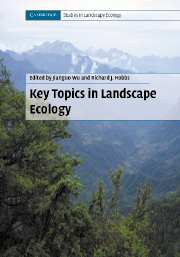Book contents
- Frontmatter
- Contents
- List of contributors
- Preface
- PART I Introduction
- PART II Key topics and perspectives
- 2 Adequate data of known accuracy are critical to advancing the field of landscape ecology
- 3 Landscape pattern analysis: key issues and challenges
- 4 Spatial heterogeneity and ecosystem processes
- 5 Landscape heterogeneity and metapopulation dynamics
- 6 Determining pattern–process relationships in heterogeneous landscapes
- 7 Scale and scaling: a cross-disciplinary perspective
- 8 Optimization of landscape pattern
- 9 Advances in detecting landscape changes at multiple scales: examples from northern Australia
- 10 The preoccupation of landscape research with land use and land cover
- 11 Applying landscape-ecological principles to regional conservation: the WildCountry Project in Australia
- 12 Using landscape ecology to make sense of Australia's last frontier
- 13 Transferring ecological knowledge to landscape planning: a design method for robust corridors
- 14 Integrative landscape research: facts and challenges
- PART III Synthesis
- Index
- References
4 - Spatial heterogeneity and ecosystem processes
Published online by Cambridge University Press: 12 January 2010
- Frontmatter
- Contents
- List of contributors
- Preface
- PART I Introduction
- PART II Key topics and perspectives
- 2 Adequate data of known accuracy are critical to advancing the field of landscape ecology
- 3 Landscape pattern analysis: key issues and challenges
- 4 Spatial heterogeneity and ecosystem processes
- 5 Landscape heterogeneity and metapopulation dynamics
- 6 Determining pattern–process relationships in heterogeneous landscapes
- 7 Scale and scaling: a cross-disciplinary perspective
- 8 Optimization of landscape pattern
- 9 Advances in detecting landscape changes at multiple scales: examples from northern Australia
- 10 The preoccupation of landscape research with land use and land cover
- 11 Applying landscape-ecological principles to regional conservation: the WildCountry Project in Australia
- 12 Using landscape ecology to make sense of Australia's last frontier
- 13 Transferring ecological knowledge to landscape planning: a design method for robust corridors
- 14 Integrative landscape research: facts and challenges
- PART III Synthesis
- Index
- References
Summary
Introduction
Understanding the patterns, causes, and consequences of spatial heterogeneity for ecosystem function is a research frontier in both landscape ecology and ecosystem ecology (Turner et al. 2001, Chapin et al. 2002, Wu and Hobbs 2002, Lovett et al. 2005). Landscape ecology research has contributed to tremendous gains in understanding the causes and consequences of spatial heterogeneity, how relationships between patterns and processes change with scale, and the management of both natural and human-dominated landscapes. There are now many studies in widely varied landscapes that elucidate, for example, the conditions under which organisms may respond to landscape composition or configuration, or disturbance spread may be constrained or enhanced by landscape pattern. The inclusion of a spatial component is now pro forma in many ecological studies, and tools developed by landscape ecologists for spatial analysis and modeling now enjoy widespread use (e.g., Baskent and Jordan 1995, McGarigal and Marks 1995, Gustafson 1998, Gergel and Turner 2002). Landscape ecological approaches are not limited only to “land” but are also applied in aquatic and marine ecosystems (e.g., Fonseca and Bell 1998; Bell et al. 1999; Garrabou et al. 2002; Teixido et al. 2002; Ward et al. 2002). However, with a few exceptions, the consideration of ecosystem function has lagged behind progress in understanding the causes and consequences of spatial heterogeneity for other ecological processes.
Ecosystem ecology focuses on the flow of energy and matter through organisms and their surroundings, seeking to understand pools, fluxes, and regulating factors.
- Type
- Chapter
- Information
- Key Topics in Landscape Ecology , pp. 62 - 77Publisher: Cambridge University PressPrint publication year: 2007
References
- 11
- Cited by

